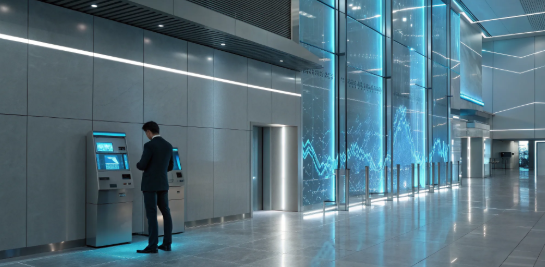Hiring in fintech has often felt like a mix of art and science, with gut feelings playing a major role in final decisions. But in an industry built on data, your talent strategy deserves the same level of precision. Relying on intuition alone can lead to inconsistent results and unconscious bias, preventing you from building the diverse, high-performing teams you need to succeed. The strategic use of AI for fintech recruiters shifts the balance, bringing data-driven insights to the forefront of your process. It helps you identify the skills and attributes that genuinely predict success, making every hiring choice more objective, informed, and aligned with your long-term business goals.
Key Takeaways
- Automate Tasks, Not Relationships: Let AI handle the repetitive work like screening resumes and scheduling so your team can focus on the human side of recruiting—building connections, assessing cultural fit, and making final hiring decisions.
- Make Data-Driven Decisions, Not Guesses: Use AI's analytical power to improve candidate matching, reduce unconscious bias, and predict a new hire's potential for success. This ensures every hiring choice is strategic and informed.
- Prioritize Human Oversight to Ensure Fairness: AI is a powerful tool, but it's not perfect. Regularly audit your algorithms and empower your team to question AI-driven recommendations to prevent bias and maintain an equitable hiring process.
How AI is Changing Fintech Recruiting
In the fast-moving world of fintech, finding the right talent quickly is everything. The traditional hiring process—sifting through stacks of resumes and scheduling countless interviews—can be a major bottleneck. This is where AI steps in, not to replace recruiters, but to give them superpowers. AI tools are streamlining the entire hiring lifecycle, from initial screening to predicting long-term success. By handling the heavy lifting, AI allows recruiting teams to focus on what they do best: building relationships with top candidates and making strategic hiring decisions.
Screen and Match Candidates Faster
Let's be honest, manually reviewing every single application is a huge time sink. AI-powered tools can analyze candidate profiles, resumes, and other data points to identify the best matches for a role in a fraction of the time. In fact, AI can screen job candidates up to 80% faster than a human recruiter, without sacrificing accuracy. By looking for specific skills, experience, and qualifications, these systems quickly surface the most promising applicants. This means your team can spend less time on administrative tasks and more time engaging with high-potential candidates for specialized roles like AI Engineering.
Automate Resume Ranking
Beyond simple screening, AI takes on the repetitive task of ranking resumes. Instead of manually sorting a pile of applications into "yes," "no," and "maybe," AI algorithms can score and rank candidates based on how well their profiles align with the job description. This automation makes the initial stages of the hiring process much quicker and more cost-effective. It frees up your recruiters to focus on more strategic work, like building talent pipelines and conducting meaningful interviews. By automating these early steps, you can create a more efficient workflow and ensure you never miss out on a great candidate who might have been lost in the shuffle.
Predict Hiring Success
One of the most powerful applications of AI in recruiting is its ability to help predict a candidate's future success. By analyzing data from past hires—like performance reviews, tenure, and career progression—predictive analytics models can identify the key attributes that lead to success at your company. This gives recruiters data-backed insights into how well a new candidate might perform and how long they're likely to stay. It’s not about a crystal ball; it’s about using historical information to make smarter, more informed decisions. This approach helps you not only fill roles but also build stronger, more effective teams with top Data Science & Analytics talent.
Why Use AI for Fintech Recruiting?
Integrating AI into your fintech recruiting process isn't just about keeping up with technology; it's about gaining a serious competitive advantage. In a field as dynamic as fintech, the race for top talent is relentless. AI tools provide the speed, precision, and insight needed to not just compete, but to lead. By automating the repetitive, time-consuming tasks that can bog down recruiters, AI frees up your team to focus on the human side of hiring—building relationships, assessing cultural fit, and selling your vision to the best candidates.
From sifting through thousands of applications to identifying the perfect skill set, AI acts as a powerful partner. It helps you move beyond traditional recruiting methods that often rely on keywords and gut feelings. Instead, you can build a strategy based on data, ensuring every hiring decision is informed and strategic. This approach leads to better hires, stronger teams, and a more efficient process overall. Let’s look at the specific ways AI can transform your fintech recruiting efforts.
Hire Faster in a Competitive Market
In the fintech industry, the best candidates are often off the market in a matter of days. If your hiring process is slow, you’re losing out on top talent. AI dramatically speeds things up by automating the initial screening process. Instead of manually reviewing every resume, AI algorithms can analyze and shortlist qualified candidates in a fraction of the time. In fact, AI can screen applicants up to 80% faster than human recruiters, without sacrificing accuracy. This efficiency allows your team to engage with promising individuals almost immediately, getting them into the interview pipeline before your competitors even have a chance.
Improve Candidate Matching
Finding a candidate with the right keywords on their resume is one thing; finding someone with the right skills and potential for the role is another. AI excels at this by looking beyond surface-level information. It analyzes vast amounts of data to identify patterns and match a candidate’s skills, experience, and even potential to your specific job requirements. This means you get a higher quality of candidate in your shortlist. By focusing on the most relevant applicants, you can dedicate more time to meaningful conversations and find the perfect fit for your team, whether you're hiring for AI engineering or data science.
Make Data-Driven Decisions
Recruiting has often been guided by intuition, but AI brings a new level of objectivity to the table. AI-powered tools provide predictive analytics that help you make smarter, data-backed hiring choices. These platforms can analyze data to forecast a candidate's potential job performance, their likely tenure with the company, and even what kind of offer might be most appealing to them. This insight allows you to move from reactive to proactive recruiting. You can build a more strategic hiring process that not only fills open roles but also contributes to long-term business goals by building a more effective and stable workforce.
Reduce Human Bias
Unconscious bias is a persistent challenge in recruiting, and it can prevent companies from building diverse, innovative teams. Even with the best intentions, human recruiters can be influenced by factors like a candidate's name, age, or background. AI helps level the playing field. Algorithms can be designed to ignore this demographic information and focus solely on skills, qualifications, and experience. By minimizing human bias, AI helps you evaluate candidates on their true merit, leading to a more fair and equitable hiring process and a more diverse talent pool.
Optimize Costs and Resources
Hiring is a significant investment, but AI can help you make the most of your budget. By automating tasks like sourcing, screening, and scheduling, AI reduces the administrative burden on your recruiting team and lowers the cost-per-hire. For example, using conversational AI to handle initial candidate interactions can substantially cut hiring costs compared to traditional methods. This efficiency doesn't just save money; it frees up your team's time and resources. They can then focus on higher-value activities, like nurturing candidate relationships and building your employer brand, which are critical for attracting top-tier machine learning talent.
Common Challenges of AI in Recruiting
Adopting AI in your recruiting process isn't a simple plug-and-play solution. While the technology offers incredible advantages, it also comes with its own set of challenges that you need to be aware of. Think of it less as a roadblock and more as a series of speed bumps—if you know they're coming, you can prepare for a much smoother ride. From ensuring data privacy and navigating algorithmic bias to integrating new tools with your existing systems, addressing these issues head-on is the key to successfully using AI to build a stronger, more effective hiring strategy. Many teams jump into AI expecting it to solve every problem overnight, only to be met with frustration. The reality is that successful AI implementation is strategic. It requires careful planning, a clear understanding of the technology's limitations, and a commitment to ethical use. By understanding these potential hurdles, you can create a plan to overcome them and truly get the most out of your investment in AI recruiting tools.
Address Data Privacy and Compliance
When you use AI in recruiting, you’re handling a massive amount of personal candidate data. This makes data security and privacy non-negotiable. You have a responsibility to protect this information from being misused or stolen, and failing to do so can lead to serious legal and reputational damage. It’s crucial to ensure any AI tool you adopt is compliant with regulations like GDPR and CCPA. Before you commit to a new platform, ask vendors tough questions about their security protocols, data encryption, and how they manage candidate information. Your candidates are trusting you with their personal details; make sure your tech stack honors that trust.
Handle Algorithm Bias
One of the biggest concerns with AI in hiring is the potential for algorithmic bias. If an AI model is trained on historical hiring data that contains unconscious human biases, the tool can learn and even amplify those same discriminatory patterns. A 2022 study found that many AI tools trained on biased data simply replicated unfair hiring practices. The goal is to use AI to reduce bias, not automate it. To counter this, you must work with vendors who are transparent about how their algorithms are built and trained. Regularly auditing your tools for fairness and ensuring they focus on skills and qualifications—not demographics—is essential for building an equitable hiring process.
Integrate with Existing Systems
A shiny new AI tool won’t do you much good if it doesn’t work with your current systems. Poor integration with your Applicant Tracking System (ATS) or other HR software can create data silos and force your team into tedious manual data entry. When valuable candidate information becomes fragmented across multiple platforms, it defeats the purpose of using AI to create efficiency. When evaluating AI solutions, prioritize those that offer seamless integration with your existing tech stack. This ensures a smooth workflow, maintains data integrity, and allows your team to focus on what they do best: connecting with great candidates.
Close the AI Skills Gap
Implementing AI tools successfully requires more than just a software license; it requires people who know how to use them. There can be a learning curve for your recruiting team, and you’ll need to invest in training to ensure everyone is comfortable and proficient with the new technology. Furthermore, the demand for skilled AI professionals is incredibly high across all industries, especially fintech. This fierce competition for talent makes it challenging to not only hire for your open roles but also to find people who can manage your AI-driven recruiting strategy. Partnering with a specialized recruitment agency can help you find the top-tier AI talent you need to stay ahead.
Debunk Common AI Myths
Fear and misinformation can create resistance to adopting AI within your team. The most common myth is that AI will replace human recruiters entirely. The truth is that AI is here to empower them, not make them obsolete. These tools are designed to automate repetitive, time-consuming tasks like initial resume screening and interview scheduling. This frees up your recruiters to spend more time on the human elements of their job, like building relationships with candidates, conducting meaningful interviews, and making strategic hiring decisions. By clearly communicating that AI is a supportive tool, not a replacement, you can foster enthusiasm and get your team excited about the future of recruiting.
How to Integrate AI into Your Recruiting Strategy
Adopting AI in your hiring process isn't about flipping a switch; it's about thoughtful integration. A strategic approach ensures you get the benefits—like speed and data-driven insights—without the potential pitfalls, such as algorithmic bias or a poor candidate experience. By treating AI as a powerful assistant rather than a replacement for your team, you can build a more efficient, fair, and effective hiring engine. The key is to start small, maintain human oversight, and commit to ongoing refinement. Here are five practical steps to get you started on the right foot.
Start with a Pilot Program
Jumping into a full-scale AI rollout can be overwhelming and risky. Instead, begin with a pilot program to test AI tools in a controlled setting. Think of it as a trial run. You can select a specific role or department to test a new AI-powered sourcing or screening tool. This allows your team to get comfortable with the technology, assess its effectiveness, and identify any kinks in the process. A pilot program gives you the data you need to make smart adjustments and measure success before committing to a company-wide implementation, ensuring a smoother transition and better long-term results.
Keep a Human in the Loop
One of the biggest misconceptions about AI in recruiting is that it’s here to replace recruiters. The reality is that AI’s true strength lies in its ability to augment human expertise. Let AI handle the repetitive, time-consuming tasks like initial resume screening or scheduling interviews. This frees up your recruiters to focus on what they do best: building relationships, assessing cultural fit, and making the final, nuanced decisions. AI is a powerful partner that provides data and efficiency, but your team’s judgment and personal touch remain your most valuable assets in securing top AI and ML talent.
Use Diverse Training Data
An AI model is only as good as the data it’s trained on. If your historical hiring data reflects past biases, the AI will learn and perpetuate them, potentially screening out qualified candidates from underrepresented groups. To build a fairer process, it’s essential to use diverse and comprehensive datasets to train your AI tools. By feeding the system a wide range of examples of what a successful candidate looks like across different backgrounds and experiences, you can actively reduce bias and improve the objectivity of your initial screening, leading to a more diverse and innovative team.
Audit Your Algorithms Regularly
Implementing an AI tool isn't a one-and-done task. To ensure your AI is performing fairly and accurately, you need to conduct regular audits of its algorithms. These checks help you confirm that the tool is functioning as intended and not inadvertently creating biased outcomes. Set a schedule—quarterly or bi-annually—to review the AI’s decisions, analyze its performance data, and look for any statistical disparities in how it treats different candidate demographics. Consistent oversight helps you catch and correct issues early, maintaining the integrity of your hiring process and building trust in the technology you use.
Mitigate Bias Risks
Proactively managing the risk of bias is critical for successful AI integration. This goes beyond just using diverse data and auditing algorithms. It involves creating a holistic strategy where you treat AI as a collaborative tool. Encourage your recruiting team to question the AI's recommendations and use their own expertise to verify its outputs. Combining the AI’s data-processing power with your team’s critical thinking creates a powerful system of checks and balances. This partnership approach is the most effective way to minimize bias and ensure you’re making the best possible hiring decisions for your organization.
AI Recruiting Tools to Consider
Once you’ve decided to bring AI into your recruiting workflow, the next step is choosing the right tools. The market is full of options, each designed to solve a specific challenge in the hiring process. From sourcing and screening to interviewing and onboarding, there’s likely an AI-powered solution that can make your job easier and more effective. The key is to identify your biggest bottlenecks and find a tool that addresses them directly.
Think about where your team spends the most time. Is it sifting through hundreds of resumes? Scheduling interviews? Writing compelling job descriptions? By pinpointing these areas, you can strategically select tools that deliver the most significant impact. Remember, the goal isn't to replace your team's expertise but to augment it, freeing them up to focus on what they do best: building relationships with top-tier candidates. Let's look at some of the most effective AI recruiting tools you can start using.
AI-Powered Applicant Tracking Systems (ATS)
Modern Applicant Tracking Systems have come a long way from being simple digital filing cabinets. AI-powered ATS platforms use machine learning to intelligently parse resumes, identify relevant skills, and rank candidates based on how well they match your job requirements. This goes far beyond basic keyword searching. These systems can understand context and semantics, helping you uncover qualified candidates who might have been missed otherwise. By automating the initial screening process, you can significantly improve key metrics like your time-to-fill and quality-of-hire. This allows your team to focus their energy on the most promising applicants from the start, streamlining your entire hiring solution.
Candidate Engagement Chatbots
Imagine being able to engage with every applicant 24/7, answering their questions and keeping them informed. That's what AI chatbots do. These bots can be integrated into your careers page to interact with potential candidates, answer frequently asked questions about the role or company culture, and even pre-screen applicants with a few initial questions. This provides an immediate, positive experience for the candidate and saves your team from answering repetitive inquiries. By handling the initial engagement, chatbots ensure that every interested person feels acknowledged while collecting valuable information that helps you make smarter hiring choices.
Video Interview Analysis
Pre-recorded video interviews are a great way to get a sense of a candidate early on, but watching them all can be time-consuming. AI video analysis tools can process these recordings for you, transcribing answers and highlighting key skills and experience mentioned by the candidate. Some tools can even analyze language and sentiment to provide additional insights. Research shows that AI can screen job candidates much faster than human recruiters, allowing you to quickly identify a shortlist of top contenders for live interviews. This is especially useful for high-volume roles or when you need to assess candidates across different time zones efficiently.
Automated Skills Assessments
In technical fields like fintech, verifying a candidate's skills is critical. Automated skills assessment platforms use AI to create, administer, and score technical tests, coding challenges, and situational judgment tests. This provides an objective, standardized measure of a candidate's abilities before you even speak with them. These tools are invaluable for roles in Data Science & Analytics or AI engineering. They also help level the playing field, as they focus purely on technical merit. By screening a wider pool of applicants based on their actual skills, these tools can help you find more diverse and qualified candidates.
Job Description Optimizers
The way you write a job description directly impacts who applies. AI-powered optimizers analyze your text and offer suggestions to make it more effective and inclusive. These tools can identify potentially biased language, recommend keywords to attract the right talent, and ensure your posting is optimized for search engines and job boards. This helps your roles get seen by a larger, more relevant audience. While the AI provides excellent suggestions, it's always a good practice to have a human recruiter oversee the process, review the final text, and ensure it aligns perfectly with your company's voice and the specific needs of the role.
How to Measure Your AI Recruiting Success
Integrating AI into your recruiting process is a big step, but how do you know if it’s actually working? It’s not enough to just feel like things are moving faster. You need concrete data to show the impact on your hiring goals. Measuring success means looking beyond surface-level numbers and focusing on the metrics that truly define a great hire. By tracking the right things, you can refine your AI strategy, demonstrate its value to your team, and make sure you’re building a stronger, more effective workforce.
Track Key Performance Indicators (KPIs)
When you introduce AI, your core recruiting goals don’t change, but how you measure them might. Instead of getting lost in a sea of data, concentrate on the AI recruitment analytics that reflect genuine results. The most important KPIs to watch are the quality of your new hires, employee retention rates, and the time it takes to fill a position. These indicators give you a clear view of whether your AI tools are helping you find the right people who will stay and contribute to your company’s success. Tracking these metrics consistently will show you exactly where your AI is making a difference and where you might need to adjust your approach.
Measure Quality of Hire
Speed is great, but quality is what really counts. The quality of hire metric tells you how well a new employee performs and contributes to the team long-term. This is your best indicator of whether your AI is identifying top-tier talent or just filling seats quickly. You can measure this through performance reviews, manager feedback, and tracking how quickly new hires reach full productivity. While there are many recruiting metrics you could track, focusing on quality of hire ensures your technology is aligned with the ultimate goal: building a high-performing team that drives your fintech company forward.
Analyze Time-to-Fill
Time-to-fill is one of the most common metrics in recruiting, and AI can certainly help shorten it. However, it’s important to remember that this number only tells part of the story. A fast hire isn’t a successful hire if the candidate isn’t a good fit. Use time-to-fill as a measure of efficiency, but always analyze it alongside your quality of hire data. The real win is when you can reduce your time-to-fill while simultaneously improving the quality of the candidates you bring on board. This balance demonstrates that your AI isn't just speeding up the process—it's making it smarter.
Evaluate the Candidate Experience
Your recruiting process is often a candidate’s first real interaction with your company, and a poor experience can be a major turn-off. Even the most attractive job offer can be rejected if the application process is frustrating or impersonal. AI tools can help you reach new and more diverse groups of job seekers, but you need to ensure the technology enhances the experience, not hinders it. Use simple surveys to gather feedback from applicants about their interactions with your AI-powered systems, like chatbots or automated screening tools. A positive candidate experience is crucial for attracting and securing top fintech talent.
Calculate Your Return on Investment (ROI)
Ultimately, you need to justify the investment in your AI recruiting tools. Calculating the return on investment goes beyond simply looking at cost-per-hire. Consider the broader financial impact, such as reduced turnover costs from hiring better-fit candidates and increased productivity from filling critical roles faster. When you can show leadership that your AI tools are not just saving time but also contributing to the company's bottom line through higher-quality hires and better retention, you build a strong case for continued investment in your talent acquisition technology.
Gain a Strategic Advantage with AI
Integrating AI into your fintech recruiting process isn't just about keeping up with technology; it's about creating a smarter, more efficient, and more effective hiring engine. By leveraging AI, you can move beyond traditional methods to find and attract the best people, build stronger teams, and prepare your organization for the future. Think of AI as a strategic partner that handles the heavy lifting, allowing you to focus on the human elements of recruiting that truly matter. It’s the key to not just filling roles, but filling them with talent that will drive your company forward.
Attract Top Talent
In the competitive fintech landscape, top candidates have their pick of opportunities. AI helps you cut through the noise by making smarter, data-backed hiring choices. Instead of manually sifting through hundreds of resumes, AI tools can analyze vast amounts of data to find patterns and precisely match a person's skills to your job openings. This means your outreach is more targeted and relevant, which appeals to high-caliber professionals who appreciate an efficient process. By focusing on the most qualified individuals from the start, you can create a better candidate experience and position your company as an employer of choice for leading AI engineers and data scientists.
Scale Your Recruiting Efforts
One of the most immediate benefits of AI is its ability to dramatically increase your team's efficiency. AI-powered tools can screen candidates up to 80% faster than a human recruiter, without sacrificing accuracy. By automating time-consuming initial steps like resume reviews and initial screenings, you free up your team to concentrate on what they do best: building relationships, conducting meaningful interviews, and closing top candidates. This automation makes the entire hiring process quicker and more cost-effective, allowing you to scale your efforts and fill critical roles faster than your competitors.
Build Diverse, Skilled Teams
Diverse teams are essential for innovation, especially in AI, where varied perspectives lead to better and fairer systems. When implemented thoughtfully, AI can be a powerful tool for reducing unconscious bias in the hiring process by focusing on skills and qualifications. To attract talent that values this, you can even include responsibilities like bias testing and explainability directly in your job descriptions. This signals a commitment to responsible AI development, which is a major draw for forward-thinking candidates. Using AI to build more inclusive teams isn't just good for culture—it's a core component of building a successful, modern fintech company.
Future-Proof Your Hiring Process
AI empowers you to shift from a reactive to a proactive hiring strategy. By analyzing historical data, predictive analytics tools can help identify the traits and skills that correlate with long-term success at your company. This allows you to predict which candidates are most likely to thrive in a role before you even make an offer. To demonstrate the impact of these tools, it's important to establish a clear measurement framework that tracks both efficiency gains and strategic value. This data-driven approach not only improves your quality of hire but also proves the tangible impact of AI on your talent acquisition goals, securing its place in your long-term strategy.
Related Articles
Frequently Asked Questions
Will AI make my recruiting team obsolete? Not at all. Think of AI as a powerful assistant, not a replacement. The goal is to automate the repetitive, time-consuming parts of recruiting, like sifting through hundreds of resumes or scheduling initial calls. This frees up your team to focus on the high-impact work that requires a human touch, such as building relationships with top candidates, assessing cultural fit, and making strategic hiring decisions.
How can I ensure AI doesn't introduce more bias into our hiring? This is a valid concern and requires a proactive approach. The key is to remember that an AI tool is only as unbiased as the data it's trained on. You should partner with vendors who are transparent about their algorithms and regularly audit your tools for fairness. Most importantly, always keep a human involved in the final decision-making process to provide critical oversight and context that an algorithm might miss.
We're a small team. What's a realistic first step to start using AI? You don't need to overhaul your entire process overnight. A great way to start is by launching a small pilot program. Pick one specific challenge you're facing—maybe it's screening candidates for a single high-volume role—and test an AI tool to solve it. This allows you to measure the impact, get your team comfortable with the new technology, and learn what works before you commit to a larger investment.
With all this automation, how do I maintain a positive candidate experience? Automation should enhance the candidate experience, not make it feel robotic. Use AI tools like chatbots to provide instant answers to common questions or to keep applicants updated on their status 24/7. This ensures no one feels left in the dark. The time AI saves your team can then be reinvested into providing more personalized, high-touch interactions during interviews and later stages of the process.
What's the most important metric to track to know if our AI tools are actually working? While metrics like time-to-fill are useful for measuring efficiency, the most critical indicator of success is your quality of hire. Are the people you're bringing on board performing well, staying with the company, and contributing to your goals? When you see an improvement in the long-term success of your new hires, you know your AI tools are helping you make smarter, more effective decisions.















